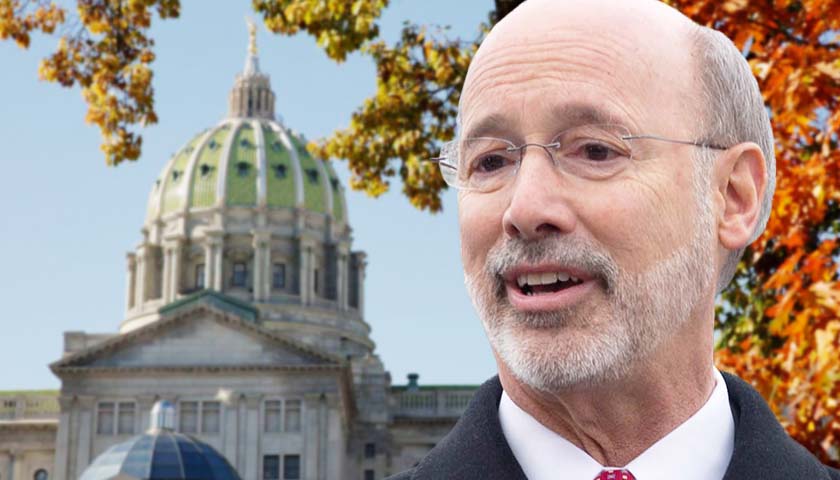by Victor Skinner
The Pennsylvania General Assembly has sent a disapproval resolution to Gov. Tom Wolf, rejecting his efforts to enroll the state in the Regional Greenhouse Gas Initiative, but vote totals show there aren’t enough opposing lawmakers to override a veto.
The House approved Senate Concurrent Regulatory Review Resolution 1, 130-70, on Wednesday. The vote total is just short of two-thirds of the chamber’s 203 members necessary to override a veto.
The resolution disapproves of the state Environmental Quality Board’s move to join the Regional Greenhouse Gas Initiative (RGGI), which was temporarily halted when Pennsylvania’s Legislative Reference Bureau ruled the House had until mid-January to reject it.
The RGGI is an initiative involving 10 New England and Mid-Atlantic states that caps carbon dioxide emissions from electric power plants. It would require Pennsylvania’s 58 fossil fuel-burning plants to purchase credits at auction for each ton of carbon released into the atmosphere.
The Environmental Quality Board made good on Wolf’s promise to join the pact and Attorney General Josh Shapiro, the only Democrat running to replace Wolf, gave his approval earlier this month. The state Senate disapproved in late October.
House Republicans argued joining the RGGI would drive up energy costs and result in thousands of lost jobs, while highlighting the state’s own efforts to cut emissions.
Rep. Donna Oberlander, R-Clarion, said she was concerned the move would shut down the Keystone Generating Station in her district. The coal-fired plant supports 1,100 jobs with a direct impact of $359 million and indirect impact of $186 million in Armstrong County.
“Pennsylvania and its energy partners have shown that we can meet cleaner air standards, and, in fact, we have exceeded those goals,” Oberlander said. “That is why it makes no sense as to why the governor and his allies would push forward with this and effectively kill more than 8,000 good jobs, including several hundred in Armstrong County.”
Oberlander noted the plant generates a half-million dollars in real estate school taxes, in addition to income taxes, and argued local communities deserve to be heard about joining the initiative.
“Our communities were given little opportunity to tell their side of the story, and when they were, their concerns fell on deaf ears,” she said. “After numerous invitations to visit our region, the governor has not stepped foot here. He ignored chances to see how our energy partners have spent millions to reduce pollutants and to ensure cleaner water and air. This issue is about protecting real jobs and real families.”
Rep. Ryan Warner, R-Fayette, pointed out the other states that have joined the RGGI did so with legislative approval.
“Implementing a tax without the approval of this House, without the approval of this Senate and without the approval of the people is nothing short of a direct attack on democracy,” he said.
Rep. Jim Struzzi, R-Indiana, also stressed what the RGGI would mean for his community and the state.
“Indiana County has two of the largest coal-fired electric generation plants in the area,” he said. “We already know if this tax is imposed, those plants will close here and move to Ohio or West Virginia, states that rely on their energy industry.
“If RGGI is imposed, we stand to lose approximately 8,000 jobs in western Pennsylvania, 1,500 of them in Indiana County alone. We will also say goodbye to more than $2.8 billion from our economy, $873,000 million of it from Indiana County. We also stand to relinquish our status as the number one energy-exporting state in the country.”
Rep. Greg Vitali, D-Havertown, defended the RGGI against Republican opposition.
“Climate change is the most serious long-term threat to this planet,” Vitali said. “Pennsylvania is a major greenhouse gas producer. RGGI is the most important thing Pennsylvania can do right now to address climate change.”
Vitali claimed widespread public support for the initiative through 10 public hearings, and said it is not a tax subject to legislative approval.
“RGGI is not a tax, it simply requires polluters to buy allowance for polluting,” he said. “RGGI has legal authority under the Pennsylvania Air Pollution Control Act.”
The disapproval resolution moves to Wolf for his signature or veto.
– – –
Victor Skinner is a contributor to The Center Square.
Photo “Gov. Tom Wolf” by Governor Tom Wolf CC BY 2.0. Background Photo “Pennsylvania State Capitol” by Governor Tom Wolf CC BY 2.0.





